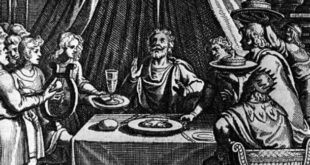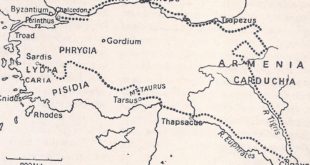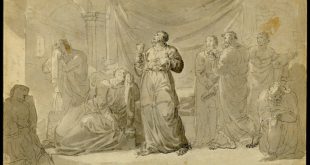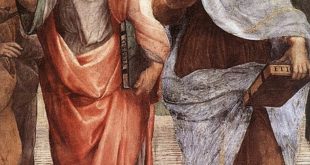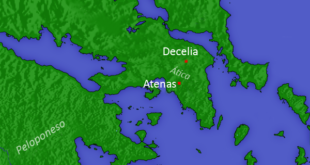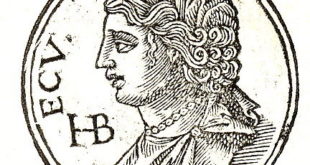Hellenistic Age is the period after Alexander’s death. Alexander drank too much on an autumn night in the year 323, or because medical science was not yet far enough advanced to cure the fever which his excesses brought on, another experiment in philosopher kingship, or at least in philosopher-guided kingship, ended prematurely. Not that Aristotle had accompanied Alexander, but they had corresponded and if Alexander had thought of settling down and concentrating on administration, Aristotle, who studied the constitutions of 158 Greek states, would have been the man to advise him. On the other hand Alexander also corresponded with his …
Read More »Hellenes – Ancient Greek Mythology
Alexander of Macedon
Unity, for a time and a philosopher king, of sorts, finally came to Greece from Macedon in the north. In the year 356 Alexander was born. Macedon under King Philip, Alexander’s father, was already recognised as a rising power. At Athens the aged teacher of oratory Isocrates (b. 436) hoped that Philip would unite the Greeks in a new crusade against Persia. The orator Demosthenes (not to be confused with the general who died in the Sicilian expedition) was for resisting Philip. He flayed the King of Macedon in a series of orations which have given us the word philippic …
Read More »Plato
Dionysius enjoyed culture as well as cruelty. He wrote poems, which were recited at the Olympic Games and one of many tragedies which he entered in the Athenian competitions took first prize. He invited famous authors and philosophers to his court, among them Plato (429-347), the writer from whose Dialogues much of our knowledge of Socrates comes. Plato had been away from Athens since the death of his beloved master and had come to Sicily in the course of travels which had included a visit to Egypt. He soon quarrelled with the tyrant Dionysius and left his court, but he …
Read More »Damocles’ Sword – The Fourth Century
Damocles’ sword. Twice in Greek history the Spartans appear as heroes — when they fought under Leonidas in the pass of Thermopylae and when they marched under Xenophon from Babylon to the Black Sea. The rest of the time we are continually hearing of their Victories but never of their achievements. As the fifth century gives place to the fourth it is still the same story. Sparta has beaten Athens at last. Sparta is supreme, but nothing spectacular happens. She does not succeed in uniting Greece. In 371, as a result of the battle of Leuctra, Thebes began a brief …
Read More »Xenophon
The other author who tells us about Socrates is Xenophon. We owe him much. In addition to writing down what he remembered of conversations with Socrates, he wrote a short account of the Peloponnesian War after 411 (Thucydides only completed his history up to that year, although he lived until 400 B.C). His most famous work was the Anabasis (“March up Country”). This describes how (401 B.C.) he joined a Greek force which had been hired by Cyrus, brother of the Persian King, in the hope of seizing the throne. The fact that Cyrus had been the ally of Sparta …
Read More »Socrates’ Death
Socrates’ death occurred in the year 399 an Athenian court condemned Socrates for opposing the official religion of the state, a practice which in fact he studiously avoided and for “corrupting the youth”, which simply meant that he tried to get young people to think things out instead of yapping slogans. When the penalty was being discussed, Socrates said that, far from being punished, he thought he ought to be given free dinners for life in return for his services to the state. This independent line did not incline the court towards leniency and they were not interested when Socrates …
Read More »Oligarchy and Athens in Defeat
Oligarchy — “rule by the few” was a form of government which Athens had not experienced since the 6th century, though it was common in many of the Greek states. This closing stage was surprisingly long. Alcibiades, having made himself unpopular at Sparta, was allowed once more to take command of the Athenian fleet, which he did with some success. On the home front the Spartans were not in a hurry. For a people of such high military reputation they were astonishingly cautious. Year after year they were content to operate from Decelea. They never tried to capture Athens by …
Read More »Decelea, a Thorn in the Flesh
Decelea near the border of Attica and Boeotia was fortified by the Spartans (413). The first piece of good advice which Alcibiades gave the Spartans was to send Gylippus to Syracuse. The second was this: “Restart the war; but don’t just invade Attica for a few weeks of the year. Fortify a position on Attic soil and hold it.” (Gilbert Murray’s translation). Raids from this post made the growing of crops more difficult than ever and cut the route to Euboea, where the cattle and goats had been sent for safety. An attack on Athens itself had constantly to be …
Read More »Hecuba, Queen of Troy
In the year when the expedition sailed to Sicily (415) Euripides put on a play, the Trojan Women, in which the wives of the defeated heroes of Troy were shown in the first bitterness of enslavement. When he wrote, Euripides was burning with the shame of the massacre of Melos; but now to those among the parched and ragged remnant of the Athenian expedition to Sicily who remembered his words they must have seemed like prophecy. As they shuffled towards the slave market or the stone quarries these once proud citizens of Athens might well recall the despairing cry which …
Read More »Sicily
Greeks had first settled round the coasts of Sicily during the colonising period and in 480 they had united to defeat a Carthaginian attempt to oust them from Sicily. Their unity, however, like that of the mainland Greeks against the Persians, did not last long and already in 427 the town of Leontini had asked for help from Athens against the Corinthian colony of Syracuse. Already settled in Sicily, now, in 416, another enemy of Syracuse, Segesta, appealed to Athens. The Athenians sent ambassadors to Segesta. These ambassadors were impressed by the wealth of the place, which the Segestans exaggerated …
Read More »

